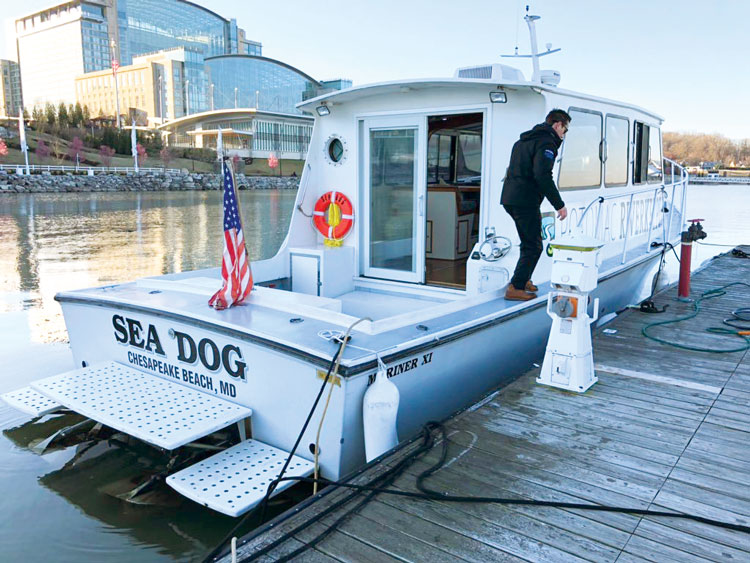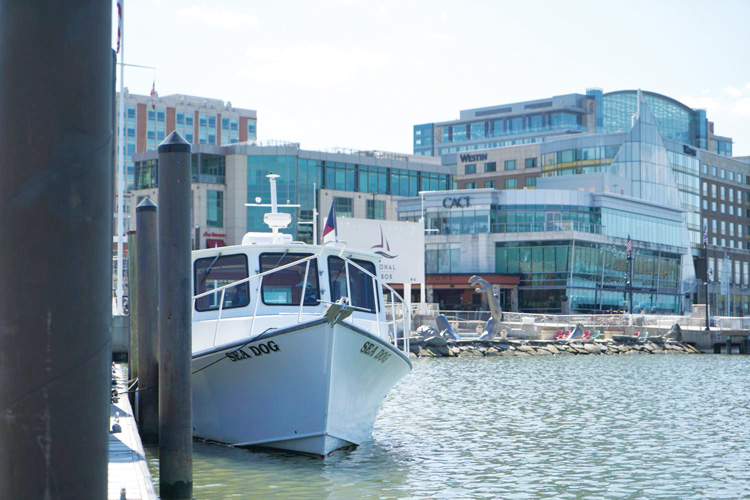Meet "Sea Dog": the new floating laboratory on the Potomac, testing water quality and serving as an on-the-water classroom and patrol boat.
The Environmental Protection Agency has yet to designate the Potomac River as “fishable and swimmable,” a fact that always came to mind during our Tuesday night races as a fellow Pentagon Sailing Club racing squadron member took his weekly dip in the Potomac prior to the start flag. He has since moved to New Zealand, so I have no way of knowing if there was permanent damage caused by his propensity to ignore EPA findings.

These days I could have rested my mind at ease by calling up “Swim Guide,” an application and website that reports on water pollutant levels to inform swimming and water-based sports at more than 7000 beaches internationally (swimguide.org). The data for Swim Guide comes from multiple local inputs, and as of this past March the Potomac River data is being provided by a repurposed Chesapeake Deadrise named Sea Dog donated to the Potomac Riverkeeper Network by a Who’s Who in the U.S. Navy.
An ecological tipping point
According to Potomac Conservancy president Hedrick Belin, the Potomac is now on the verge of being one of the nation’s great river recovery stories. “The comeback from where the river was just 10 years ago has been tremendous,” he said. According to Belin, the Potomac may be nearing an ecological tipping point. “The speed at which Mother Nature, once given the space, has rebounded is remarkable… It’s happening a little faster than we expected, but we can’t take it for granted.”
Potential swimmers, water skiers, or paddleboarders can’t rely on the Potomac Conservancy’s annual State of the River report to guide their water activities, and according to Potomac Riverkeeper Dean Naujoks, no one knows what the river quality is day-to-day or even week-to-week. Naujoks relayed that Potomac Riverkeepers receive calls about the safety of swimming in the river, but there is no data to provide an informed response. According to Belin, that may soon be possible.
“In the next 10 years, the Potomac is poised to be the next urban river where you can go swimming,” Belin said. And that’s where Admiral J. Paul Reason (Retired) and his 42-foot Chesapeake Bay Deadrise named Sea Dog step in.

The Admiral
If you do a web search for “The History Makers” and check out the “MilitaryMakers” category, you’ll run across the profile of Admiral J. Paul Reason (Retired). A Naval Academy grad, he became the first African American four-star admiral in the U.S. Navy. Each Military Maker profile includes favorite quotes such as “Do justly, love mercy, walk humbly with thy God,” or “Let your reach far exceed your grasp.” Reason’s favorite quote simply says: “Sail Safely.”
After a lifetime of shaping history on the water, at 77-years-young Reason is once again making history possible by donating his family recreational boat Sea Dog to the Potomac Riverkeeper Network to be retrofitted and transformed into an on-the-water laboratory.
Why donate a perfectly good vessel? “We’re getting a little long in the tooth to go around boating all the time,” said Reason, referring to himself and his wife Dianne. “We found really no better utility for this boat that was really like a member of our family than to contribute it to the Riverkeepers, because after all the years at sea and going into many rivers of the world, I have gained a significant regard for those who are titled Riverkeeper,” Reason said. “The Potomac is my home river. I’m a native Washingtonian.”
Sea Dog’s new float plan
Sea Dog’s new float plan reflects its new purpose as a floating laboratory on the Potomac, testing water quality and serving as an on-the-water classroom and patrol boat. Based on data gathered onboard, scientists and citizens will be able to observe and document the improving health of the river.
Sea Dog will monitor water quality from six points along the river. Weekly readings will reveal water quality, to include bacteria levels, temperature, pH level, and turbidity. The most important metric, Naujoks said, will be the bacteria readings; the risk of high bacteria levels after a heavy rainstorm is a key reason it is considered “unsafe” to swim in the river. Sea Dog’s results will be posted online and on the Swim Guide app.
“Having a great boat like this one, a working boat, a boat that we can use to patrol and to monitor water quality, is really going to help us in our work,” said Nancy Stoner, president of the Potomac Riverkeeper Network.
“This is like a dream come true,” Naujoks said. “I don’t think we’d be able to launch a robust water quality monitoring program throughout the entire Potomac River without having this boat and lab on it. This allows us to do this stuff right on the water. This boat will allow us to do it right.”
This past March, Riverkeepers and environmental advocates welcomed Sea Dog on its new journey with a toast and second christening. “Today, in the name of all who have sailed aboard this vessel in the past, and all who may sail aboard her in the future, we ask that the gods of wind and of the sea favor us with a blessing today,” Stoner said.
Crews rung the bell onboard Sea Dog.
Reason said, “It’s the right time for us and hopefully it’s the right time for the Potomac Riverkeeper to keep her on track and doing good work.” Sea Dog’s home port will be National Harbor. Hopefully she’ll be providing the data to stay on top of the Potomac River’s health for years to come, and hopefully we Potomac River dwellers will soon witness the tipping point at which the Potomac will become “swim friendly” all year round.
Article by Cynthia Houston
For several years, Cynthia Houston has contributed insightful environmental columns to SpinSheet. We wish her luck in her new adventure working on her PhD focused on environmental communications at the University of Maine.




